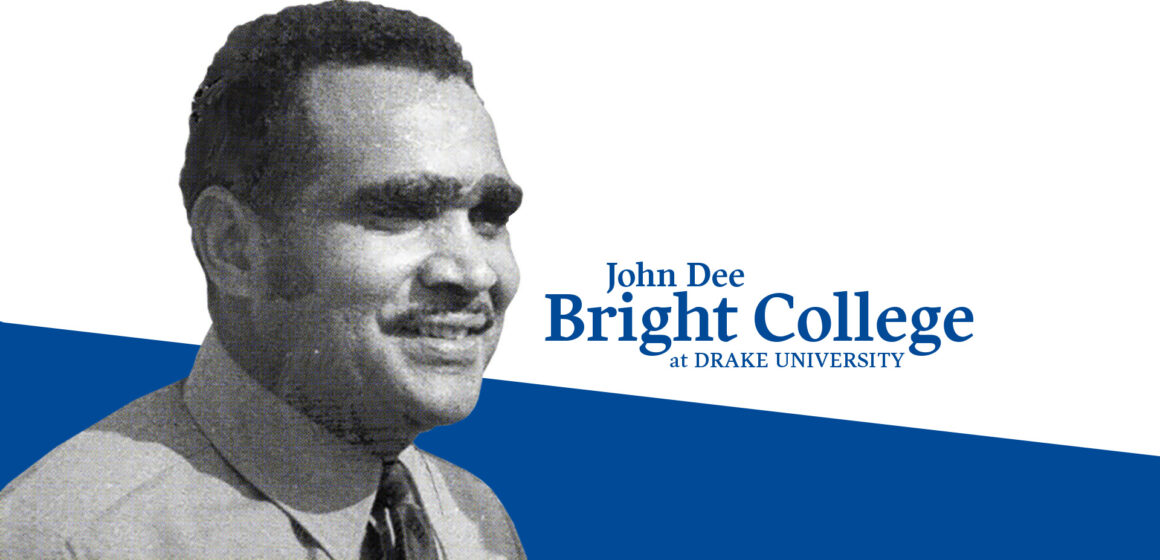College named after famous Drake alumnus, athlete, and educator
(DES MOINES, Iowa—September 1, 2020) Today Drake University announced the founding of a new college that will make the exceptional Drake University education more accessible to more students. The John Dee Bright College at Drake University will grant two-year associate’s degrees in the integrated arts, sciences, and humanities, as well as in business, organization, and professional studies. The college will welcome its first students in the fall 2021 semester.
“The John Dee Bright College creates a new pathway into Drake University that will be uniquely tailored to meet the educational needs of a diverse array of students who have often not seen Drake as their potential collegiate home,” said Drake University President Marty Martin. “Our new Bright College students will bring with them life experiences, perspectives, and ways of thinking and being in the world from which the whole Drake community can learn.”
Craig Owens, a Drake University English professor and director of the University’s Center for Teaching Excellence, will serve as dean of John Dee Bright College. Owens, who has taught at Drake since 2003, has been working with faculty colleagues and university leadership on establishing the college since spring of 2019.
“Bright College graduates will be prepared to launch their careers or pursue a four-year degree at Drake or another institution,” Owens said. “They will graduate with new skills and refined approaches for thinking critically, problem solving, collaboration and communication.”
Cohort-based Structure
Students in the John Dee Bright College will take classes as part of a learning cohort. This approach means they will work through the program with the same group of classmates in each course they take. Students taking classes in a cohort more easily build valuable friendships and networks with other students. Courses will have clearly defined goals, and faculty will serve not just as instructors but also as mentors and advisors to their students. Drake is one of only a few private colleges nationwide to offer a two-year program of any kind.
“Students in the John Dee Bright College will have access to the same resources as students in our four-year programs,” Owens said. “They will collaborate closely with their professors to develop professional and academic aptitudes that will carry them into their professions and last for a lifetime.”
The annual tuition for the degrees offered by the John Dee Bright College will be $18,500. Drake University will work with students and their families to leverage state and federal grants along with institutional financial aid to make a Bright College degree attainable for any student admitted to the program. Drake representatives will be meeting with teachers and school counselors, and prospective students and their families to explain how qualified students can take advantage of this new pathway to a Drake degree.
Carrying Forward the Legacy of John Dee Bright
John Dee Bright, known to the Drake community as “Johnny Bright,” was a celebrated 1952 Drake graduate who starred on the football field for the Bulldogs and built a successful career as a committed educator and beloved principal in Edmonton, Alberta, Canada. Bright passed away in Edmonton in 1983 at the age of 53.
“Naming Bright College in Johnny’s honor pays tribute to his personal and professional qualities—the very qualities Bright College will instill in its learners: grit, resilience, dedication, drive, and civic and professional engagement,” Martin said.
Sadly, a vicious play in Stillwater, Oklahoma, robbed Bright of a certain Heisman Trophy in 1951. Two years previously, Bright had been the first Black football player to play a game at Oklahoma A&M College (now Oklahoma State University). On an early Drake offensive play in the 1951 game, an Oklahoma A&M lineman charged Bright—who did not have the ball—and hit him in the face, breaking Bright’s jaw. To honor his athletic accomplishments, Drake University named the football field at Drake Stadium the Johnny Bright Field in 2006.
Photographs of the incident caused a national outrage and heightened awareness of the racism Black athletes faced. The sequence of images earned Des Moines Register photographers John Robinson and Don Ultang a Pulitzer Prize for Photography in 1952.
Following the assault on Bright in the Oklahoma A&M game, Drake University withdrew from the Missouri Valley Conference after the conference refused to take any action against Oklahoma A&M. Bradley University also left the MVC in solidarity with Drake. President David Schmidly of Oklahoma State University issued a letter of apology for the incident to Drake University in 2005. President Schmidly referred to his team’s behavior as “an ugly mark on Oklahoma State University and college football.”
The NFL’s Philadelphia Eagles drafted Bright with the fifth pick in the first round of the 1952 NFL draft. Bright would have become the Eagles’ first Black player. Due to the likelihood of racist reprisals, Bright chose to take his talents to the Canadian Football League where he became one of Canada’s most accomplished professional football players ever. Bright was inducted into the CFL Hall of Fame in 1970.
Bright used his bachelor’s degree in education from Drake to work as a teacher, coach, and school administrator in Edmonton Public Schools during and after his football career. He coached football at Bonnie Doon High School throughout the 1960s. At the time of his death he was a junior high school principal. The Johnny Bright School, a kindergarten through grade nine school in Edmonton, bears his name.
###


